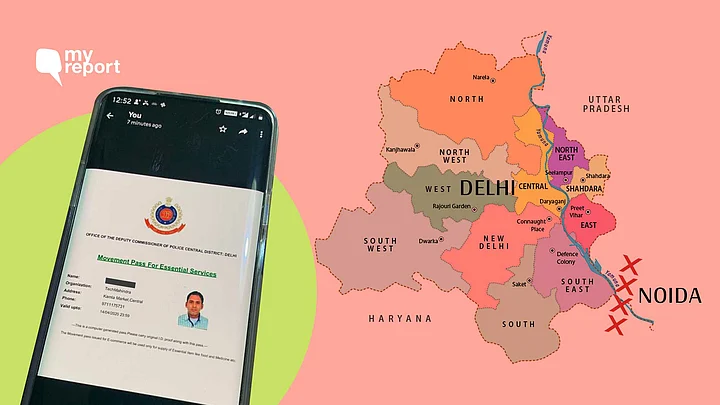I am Kanika Arora, a law student at the University of Delhi. Both my grandparents tested positive for COVID on 23 April. We admitted them to Ujala Cygnus Sonia Hospital in Nangloi, Delhi on 24 April. Within three days, ie on 26 April, my grandfather passed away.
We bottled our emotions after my grandfather’s demise as our family wanted grandmother to get well soon. We were desperately trying to arrange for better medical care because we knew that the oxygen supply at hospitals was not sufficient.
The hospital ran out of oxygen every three to five days.
On 2 May, we found a friend, who had an oxygen concentrator, stepped up to help. My father immediately sent out our driver to Noida, where the friend lived, to collect the concentrator as all of us were in isolation.
At this point, my grandmother’s condition was critical and we needed immediate help. Our driver called us, informing that police had stopped the car near East Delhi and denied him access to Noida.
When questioned, the police said that anybody crossing the borders of the city should produce an e-pass.
As my father reasoned with the officer from Delhi Police, who was at the other end of the phone, trying to impress upon him the emergency, my grandmother was gasping for oxygen in the hospital.
I immediately opened the Delhi government website to understand the process of applying for an e-pass. Being under the impression that an e-pass is required only by people providing essential services, I frantically attempted to understand the formalities required to be fulfilled by the attendants of patients. Many have been on the roads for the past two weeks, trying to save their family members amid a failing health system in Delhi.
The website had no information if a patient’s attendants required an e-pass to move around in an emergency during the curfew.
A friend of mine then told me about a ‘movement pass’ being provided by the Delhi Police to facilitate the movement of individuals in cases of extreme emergencies. I immediately registered for the pass on the Delhi Police official website.
It took me multiple attempts to generate a user ID. I then uploaded all the documents required for the registration. It took me almost 20 minutes to finish the formalities.
The form was submitted at 9:05 pm. My family and I were anxiously waiting for the pass. But all that I received was a rejection of my request. Unable to understand why my medical emergency request to collect the oxygen support for my ailing grandmother was rejected by the police, I reapplied for the movement pass, this time explaining the urgency of the situation. The second request was also rejected.
Understanding my situation, a friend of mine tweeted asking, “How long should one wait to get a movement pass in Delhi for a medical emergency?” The reply we received shocked me.
The Delhi Police’s reply to the tweet said that we are allowed to travel for getting medical or health services on the production of a valid medical documents and that it was not required to get an e-pass.
I was confused with the reply because when our driver submitted the medical documents to the police, including the vital reports of my grandmother, he was denied to entry.
At times when our social media and WhatsApp are being flooded with leads on hospital beds far away from Delhi, it’s taking weeks to find life-saving injections, and people are standing in kilometers-long queues to get oxygen refills, why is unfettered power being given to a police officer to decide the fate of a COVID patient?
Why is a non-medical worker being allowed to decide whether a situation is a medical emergency or not? Are we still trying to find a place for law and order in a country that has already descended into chaos?
(All ‘My Report' branded stories are submitted by citizen journalists to The Quint. Though The Quint inquires into the claims/allegations from all parties before publishing, the report and the views expressed above are the citizen journalist's own. The Quint neither endorses, nor is responsible for the same.)
(At The Quint, we question everything. Play an active role in shaping our journalism by becoming a member today.)
